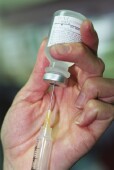
FRIDAY, Jan. 18 (HealthDay News) — Most people think of the flu when the word “vaccine” comes up in conversation, but several vaccines also exist to help prevent cancers.
Not only that, numerous researchers are also working to harness the power of the body’s immune system to develop vaccines to help treat cancer.
“Essentially, cancer treatment vaccines are the ultimate in personalized medicine,” said Dr. Linda Liau, director of the brain tumor program at the University of California, Los Angeles. Liau is currently researching a brain cancer treatment vaccine.
Dr. Jeffrey Hardacre, who’s researching a pancreatic cancer vaccine, agreed.
“This is an area that remains in its infancy, and I think we only have brighter things to look forward to,” he said. “Using the body’s immune system is a potent way to fight cancers.” Hardacre is an associate professor of surgery and head of the pancreatic surgery section at the University Hospitals’ Seidman Cancer Center at Case Western Reserve University in Cleveland.
Cancer vaccines come in two types: preventive and treatment, according to the U.S. National Cancer Institute. Preventive vaccines, sometimes called prophylactic, seek to keep cancers from occurring in the first place. Treatment vaccines, also known as therapeutic vaccines, target the cancer someone already has to help keep it from coming back after treatment.
To date, the U.S. Food and Drug Administration has approved several preventive cancer vaccines, which can prevent some types of cervical cancers and certain liver cancers. They work much like standard vaccines do, essentially teaching the body’s immune system to target the virus that’s been linked to the development of cancer.
First to be approved was a vaccine that prevents hepatitis B and has been shown to protect against liver cancers caused by the virus. According to the CDC, one brand of the vaccine, Recombivax, is given in two doses to adolescents. The other, Twinrix, requires four doses.
In addition, two vaccines have been approved to prevent cervical cancer. The vaccines, Gardasil and Cervarix, work by preventing infection with the two strains of the human papillomavirus (HPV) that are responsible for about 70 percent of all cervical cancers, according to the U.S. National Cancer Institute. Gardasil also offers protection against genital warts. Because HPV can be sexually transmitted, the vaccines are most effective when given to young people before they become sexually active. They’re currently recommended for females and males between the ages of 9 and 25.
Health experts believe that other cancers that may be caused by viruses, bacteria or parasites could also be good candidates for preventive vaccines, including certain lymphomas, nasopharyngeal cancers, Kaposi sarcoma, adult T-cell leukemia, stomach cancer and bladder cancer.
Treatment vaccines, on the other hand, are designed to use the body’s immune system to target cancer cells that have not been destroyed by other treatments. This can be a challenge, however, because cancer cells are very adaptable and often develop in ways that can’t be detected by the body’s immune system. Cancer treatment vaccines aim to teach the immune system cells to recognize the cancer cells as foreign and attack them.
The first treatment vaccine — Provenge, for certain types of metastatic prostate cancer — received FDA approval in 2010. According to the U.S. National Cancer Institute, the vaccine is tailored to each person’s particular cancer.
Trials of treatment vaccines currently under way include vaccines for bladder, brain, breast, cervical, kidney, lung, skin, pancreatic and prostate cancers, as well as for Hodgkin and non-Hodgkin lymphoma, leukemia and multiple myeloma.
Liau and her colleagues are currently conducting phase 2 clinical trials on people with certain types of brain cancer, called glioblastomas. Their vaccine, like the approved prostate cancer vaccine, uses the patient’s own cancer cells to develop a unique vaccine specific to that person’s cancer.
“The five-year survival is less than 5 percent for glioblastoma, and the average survival is about two years,” Liau said. “We have several patients that are at eight and 10 years, and one who’s at 12 years, but not everybody responds. One thing we have found is there are probably certain genetic subtypes that are more amenable to [vaccines].”
It’s just those types of genetic differences that Hardacre said will probably keep researchers from being able to develop a universal cancer vaccine.
“I would find it hard to believe that there could be a single vaccine to deal with multiple types of cancers,” he said.
More information
For more about cancer vaccines, go to the U.S. National Cancer Institute.
Read about the development of cervical cancer vaccines.

